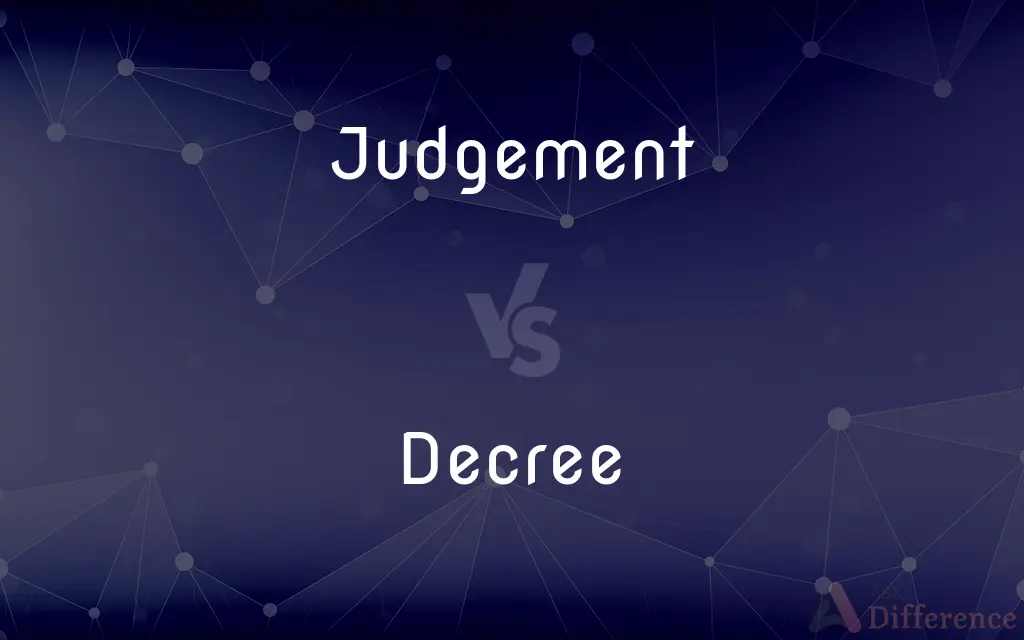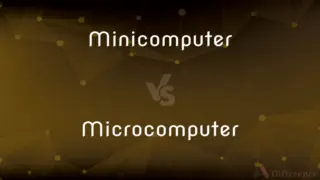Judgement vs. Decree — What's the Difference?
By Urooj Arif & Maham Liaqat — Updated on March 19, 2024
Judgment is a court's final decision on the matters before it, whereas a decree is an official order by the court to enforce that judgment.

Difference Between Judgement and Decree
Table of Contents
ADVERTISEMENT
Key Differences
Judgment involves the final decision made by a court after considering the facts and law, determining the rights of the parties involved. It signifies the conclusion of a lawsuit. On the other hand, a decree, particularly in civil cases, is the formal expression of the judgment, specifying the court's order regarding the rights and liabilities of the parties.
Judgments are broader in scope and can include the court's reasoning, findings on law and fact, and the outcome. Whereas decrees are more focused, often detailing the specific actions that must be taken or the conditions to be met as a result of the judgment.
In the context of legal proceedings, a judgment serves as the basis for the issuance of a decree. A decree, in turn, becomes enforceable, outlining the specific measures that the losing party must adhere to.
While judgments can be declaratory or constitutive, providing a general declaration of law or rights without ordering any action, decrees are inherently actionable, aimed at enforcing or giving effect to the judgment.
Judgments conclude the judicial consideration of a case, reflecting the court's final decision, while decrees are instrumental in the implementation of that decision, serving as a bridge between judgment and enforcement.
ADVERTISEMENT
Comparison Chart
Definition
Final decision of the court on a legal matter.
Official order by the court to enforce a judgment.
Scope
Broader, can include reasoning, findings, and outcomes.
Narrower, specifies enforcement actions or conditions.
Function
Concludes the case, determining the outcome.
Implements the judgment, detailing enforcement steps.
Type
Can be declaratory or constitutive.
Actionable, leading to enforcement.
Legal Effect
Reflects the court's final decision on the case.
Bridges judgment and its enforcement, operational in nature.
Compare with Definitions
Judgement
May declare rights without ordering action.
The court's judgment clarified the law's interpretation.
Decree
Enforces the legal rights determined by judgment.
The decree enforced the settlement agreement.
Judgement
Represents the court's reasoning and findings.
The judge's judgment was detailed and well-reasoned.
Decree
Specifies actions to enforce a judgment.
The decree required payment of unpaid wages.
Judgement
Legal conclusion by a judge or court.
The judgment resolved the dispute between the neighbors.
Decree
Court's order following a judgment.
The decree mandated the restitution of the property.
Judgement
Reflects the outcome of legal proceedings.
The judgment favored the plaintiff, granting damages.
Decree
Operative part of the court's judgment.
The court issued a decree finalizing the divorce.
Judgement
The court's final decision on a matter.
The judgment in the fraud case was announced yesterday.
Decree
Implements the decision made in the judgment.
The decree ordered the cessation of illegal activities.
Judgement
Judgement (or US spelling judgment) is also known as adjudication which means the evaluation of evidence to make a decision. Judgement is also the ability to make considered decisions.
Decree
A decree is a rule of law usually issued by a head of state (such as the president of a republic or a monarch), according to certain procedures (usually established in a constitution). It has the force of law.
Judgement
Variant of judgment.
Decree
An authoritative order having the force of law.
Judgement
Alternative spelling of judgment.
Decree
The judgment of a court of equity.
Judgement
The legal document stating the reasons for a judicial decision;
Opinions are usually written by a single judge
Decree
The judgment of a court.
Judgement
An opinion formed by judging something;
He was reluctant to make his judgment known
She changed her mind
Decree
A doctrinal or disciplinary act of an ecclesiastical authority.
Judgement
The cognitive process of reaching a decision or drawing conclusions
Decree
An administrative act applying or interpreting articles of canon law.
Judgement
Ability to make good judgments
Decree
To order, establish, or decide by decree
Decreed that the two kingdoms would be united.
Judgement
The capacity to assess situations or circumstances shrewdly and to draw sound conclusions
Decree
To issue a decree.
Judgement
(law) the determination by a court of competent jurisdiction on matters submitted to it
Decree
An edict or law.
Judgement
The act of judging or assessing a person or situation or event;
They criticized my judgment of the contestants
Decree
(legal) The judicial decision in a litigated cause rendered by a court of equity.
Decree
(legal) The determination of a cause in a court of admiralty or court of probate.
Decree
(religion) A predetermination made by God; an act of providence.
Decree
To command by a decree.
A court decrees a restoration of property.
Decree
An order from one having authority, deciding what is to be done by a subordinate; also, a determination by one having power, deciding what is to be done or to take place; edict, law; authoritative ru decision.
There went out a decree from Cæsar Augustus that all the world should be taxed.
Poor hand, why quiverest thou at this decree?
Decree
A decision, order, or sentence, given in a cause by a court of equity or admiralty.
Decree
An edict or law made by a council for regulating any business within their jurisdiction; as, the decrees of ecclesiastical councils.
Decree
To determine judicially by authority, or by decree; to constitute by edict; to appoint by decree or law; to determine; to order; to ordain; as, a court decrees a restoration of property.
Thou shalt also decree a thing, and it shall be established unto thee.
Decree
To ordain by fate.
Decree
To make decrees; - used absolutely.
Father eternal! thine is to decree;Mine, both in heaven and earth to do thy will.
Decree
A legally binding command or decision entered on the court record (as if issued by a court or judge);
A friend in New Mexico said that the order caused no trouble out there
Decree
Issue a decree;
The King only can decree
Common Curiosities
What is a judgment?
A judgment is a court's final decision regarding the matters presented during legal proceedings, determining the rights and liabilities of the parties involved.
Can a decree exist without a judgment?
No, a decree is issued based on a judgment; it cannot exist without a prior judgment.
What is a decree?
A decree is an official order issued by a court, based on a judgment, specifying the actions necessary to enforce the court's decision.
Are all judgments followed by decrees?
In civil law contexts, judgments are typically followed by decrees, especially when specific enforcement actions are necessary.
Is a judgment enforceable by itself?
A judgment outlines the outcome of a case, but it is the decree that is specifically designed to be enforceable.
How does a judgment differ from a decree?
A judgment is the court's final decision on a case, while a decree is an order that puts that decision into effect.
Who issues a decree?
A decree is issued by the court that has jurisdiction over the case and has rendered a judgment.
Can a judgment change legal precedent?
Yes, judgments, especially from higher courts, can change legal precedent, influencing future cases.
Can a decree be appealed?
Yes, like judgments, decrees can be appealed to a higher court if there are grounds for appeal.
What is the purpose of a decree?
The purpose of a decree is to ensure that the judgment handed down by the court is implemented and enforced.
What happens if a decree is not complied with?
Non-compliance with a decree can lead to legal penalties, including fines or imprisonment for contempt of court.
Are decrees issued in criminal cases?
Decrees are typically associated with civil cases; criminal cases involve judgments and sentencing rather than decrees.
Does a decree conclude legal proceedings?
While a decree moves towards the enforcement of a judgment, it might not conclude legal proceedings if there are appeals.
Share Your Discovery

Previous Comparison
Minicomputer vs. Microcomputer
Next Comparison
Construct vs. TheoryAuthor Spotlight
Written by
Urooj ArifUrooj is a skilled content writer at Ask Difference, known for her exceptional ability to simplify complex topics into engaging and informative content. With a passion for research and a flair for clear, concise writing, she consistently delivers articles that resonate with our diverse audience.
Co-written by
Maham Liaqat















































